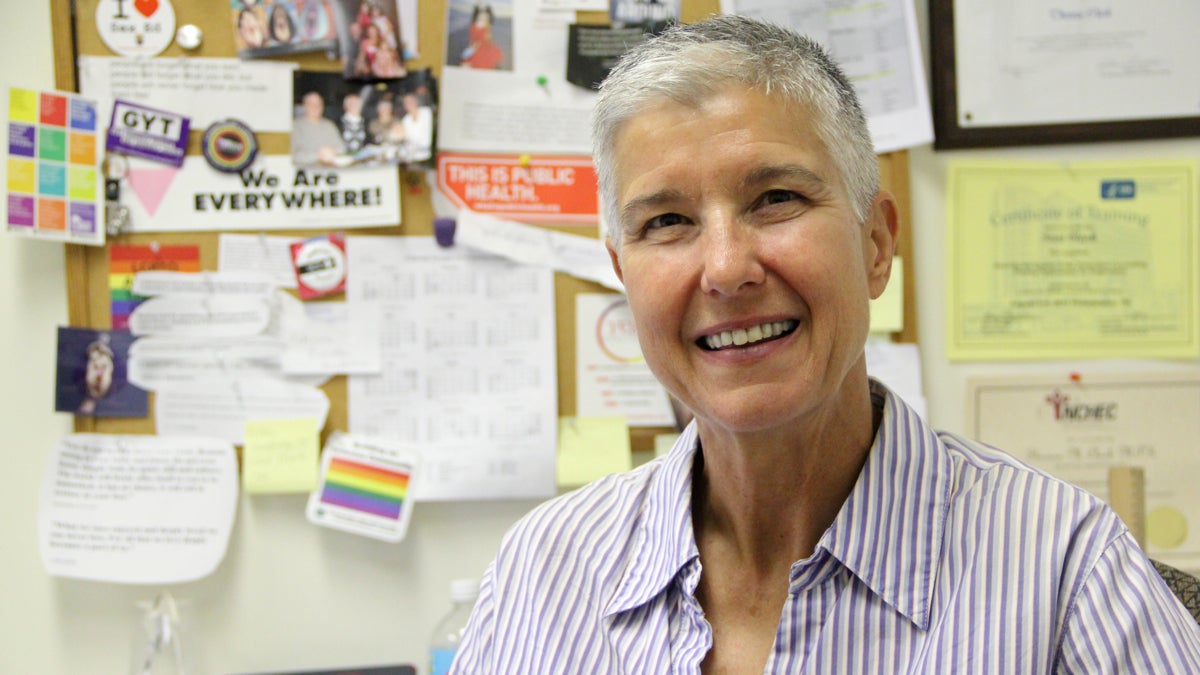One woman’s message to Philly seniors: Stay sexy

Sex educator Theresa Clark is shown in her office at ActionAIDS on Arch Street in Philadelphia. (Emma Lee/WHYY)
Sex is probably the one subject you don’t bring up with your parents, but it’s the main topic of conversation when Theresa Clark, 56, visits senior centers in Philadelphia.
“Prime Time” is a bi-weekly series featuring people over 50 in the Philadelphia region who are taking on new challenges. They are starting new businesses, dedicating themselves to activism, and becoming a part of the change they wish to see. Email us to nominate someone.
—
Sex is probably the one subject you don’t bring up with your parents, but it’s the main topic of conversation when Theresa Clark, 56, visits senior centers in Philadelphia.
Attendees at Clark’s “Sexcessful Aging” workshops can’t wait to share. Clark recently wrote about a workshop she conducted in April. A participant asked her:
“Will I have a chance to talk about Eddy today?”
My response: “Sure, tell me more about Eddy.”
Older adult: “Eddy is my vibrator.”
Funded by a grant from Philadelphia Corporation for Aging, Clark’s workshop helps seniors understand the distinction between sex and sexuality. “It’s not just what’s going on between our legs,” says Clark. “It’s about the ongoing need for intimacy, affection, warmth and sensuality.”
Sexuality a lifelong journey
The workshop dispels the myths about sexual health and aging. Think sex ends with your Medicare card? Guess again.
“Sexuality begins in utero as we are developing as human beings and ends with our death,” says Clark. “It is the total expression of who we are as human beings. It encompasses our whole psychosocial development — our values, attitudes, physical appearance, beliefs, emotions, attractions, our likes/dislikes, our spiritual selves, and is influenced by our values, culture, socialization, politics, and laws.”
In her workshops, Clark refers to the “Circles of Sexuality” model developed by Dennis Dailey, an expert on aging. The five circles are: intimacy, sensuality, sexual identity, sexual health and reproduction, and sexualization.
“As we age, our desire for sex may diminish, but our need for caring, comforting and intimate touch is as strong as ever,” says Clark. “Even if you (or your partner) are ill or have physical disabilities, you can engage in touch and/or intimate acts and thereby benefit from closeness with another person.”
Clark points out that for some LGBT people, romance and intimacy may begin at 50 or 60 or later. “Many of us were closeted or married for much of our lives,” says Clark. “Some waited until their family was grown, after divorce or the death of their spouse before coming out. For them, expressing intimacy in a long-awaited relationship is alive and well.”
Confidence, honesty and safety
But what if seniors can’t afford the multiple surgeries that keep Hollywood celebrities from aging? Clark doesn’t shrink from discussions about decreased muscle tone and strength, weaker bladders, drying vaginas, lower libidos and sagging boobs and bellies. But she balances these changes with the independence and self-confidence that come with age.
“No matter your gender, you may feel better about your body at 72 than you did at 22. And, it is likely that you now know more about yourself and what makes you excited and happy. If you can accept aging as natural, you’ll not only feel better, you’ll also be more attractive to others. Confidence and honesty can be sexy and appealing,” she says.
Clark, who has a master’s degree in public health and community health education, has been on the front lines of sex education for over 25 years. She is a member of the Consortium on Sexuality and Aging and an adjunct instructor at Arcadia University.
Part of Clark’s mission is to remind senior citizens that their age doesn’t protect them from HIV and other STDs. As prevention services coordinator at ActionAIDS in Philadelphia, she stresses the importance of using condoms, lubricating gels and safe-sex practices. Clark teaches seniors living with HIV how to have “safe, sexy sex.” (Studies project that by 2015, more than half of people living with AIDS will be over 50.)
Clark also educates social and health-care agencies across Pennsylvania about the aging LGBT community. “Once you get outside the city, these agencies are often inexperienced in dealing with gay, lesbian, transgender and bisexual individuals,” says Clark. “We educate them to make sure that the senior LGBT community is treated with respect and receives the same quality of service as anyone else.”
WHYY is your source for fact-based, in-depth journalism and information. As a nonprofit organization, we rely on financial support from readers like you. Please give today.

